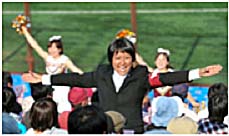Waseda cheering squad leader breaks the gender barrier
BY YOSHIE WATANABE STAFF WRITER (The Asahi Shimbun)

A young college coed leading a cheering squad would hardly be considered newsworthy at a U.S. university.
At Japan's prestigious Waseda University, however, it qualifies as just that.
Breaking the glass ceiling, Miki Kogure was recently appointed as the first female "leader" in the long and storied history of Waseda's cheering squad.
In Japan, a university cheering squad usually consists of cheerleaders, a brass band, and leaders, who are typically male students in traditional black school uniforms hollering at the top of their lungs.
Kogure, an 18-year-old first-year law student, is the first female in the 71-year history of Waseda's cheering squad to take on the leader role traditionally carried out by males. Much like her male counterparts, she wears a black pantsuit during games at which she is leading the cheers.
At Tokyo's Jingu Stadium, where Waseda is locked in a heated battle in the Tokyo Big Six Baseball League, Kogure leads the coordinated applause of the fans, arching her back. By the end of the game, her black suit is dotted with sweat stains, but that doesn't bother Kogure.
"When I see the audience looking really happy, I forget how tired I am," says Kogure, smiling energetically.
The cheering squad leaders must coordinate and lead the traditional cheerleaders with pom-poms and a brass band. The leaders, who specialize in chanting and yelling, lead the way with loud vocal instructions, the use of drums and exaggerated arm movements.
Kogure is also the first female leader of a cheering squad to lead supporters in the Tokyo Big Six Baseball League, which has a history dating to 1925.
Kogure wasn't always so keen on "invading" a man's world. She started her cheerleading career while attending Waseda University Honjo Senior High School in Saitama Prefecture. Back then, she had long hair and loved to sing and dance to music by popular girl group AKB48 during karaoke sessions.
Her career change came in the spring of her third year of high school. Kogure went to Jingu Stadium to "study more about cheerleading," but says she was "moved by the sense of oneness between the cheering squad leader and the fans."
Due to her passionate personality, which makes her "dive in head-first when I'm hooked on something," she commuted to Jingu Stadium every week from her home in Maebashi, Gunma Prefecture, hopping the first train out of her station early in the morning.
After high school, she enrolled at Waseda University and knocked on the leader's door. In the past, female students were not accepted for the leader role on the basis that women lacked the physical stamina needed for the long hours of hollering in the steaming heat or carrying the heavy school flag for long periods. But that year, captain Takuya Higuchi, 23, decided to let Kogure into the squad, saying, "There is no explicit rule that says this position is open only to men. This is no longer an age when we place limits on male and female roles."
Training was tough. The members would run 10 kilometers while yelling slogans, sometimes while carrying the 15-kg school flag. Kogure endured a rigorous 11-day summer training camp as well, determined not to taint the history of the long-established squad.
Her efforts helped her win the respect of her teammates. Fourth-year student Wataru Shibayama, 21, who admits he initially had reservations about a woman leading the squad, says, "When I saw her dedication and guts, I couldn't help but accept her."
The squad believes that it is not necessary for Kogure to look and sound like a man just because she has taken on a typically male-dominated role. She wears pantsuits instead of a male school uniform, and Kogure is not forced to use a lower-pitched voice to resemble men. Amid the stern-looking male members, Kogure often cracks a smile. She is now determined to be her idea of an "ideal female leader," one who is powerful but true to her nature.
Her goal is to "contribute to a squad that opens up the hearts of the audience and brings the stadium together as one."
Cheering squad manager Toshiro Komikado, 60, has high expectations for the first female leader.
"I hope she will bring a breath of fresh air to the squad," he says.
Photo: Miki Kogure cheers on the Waseda University baseball team at Jingu Stadium. (Mari Endo)



